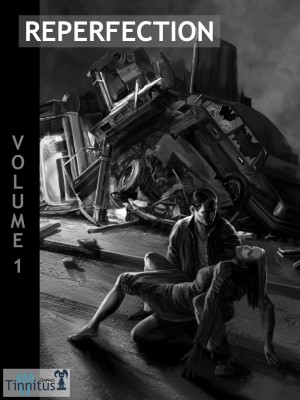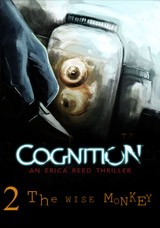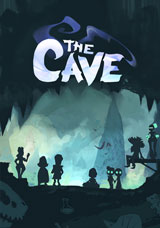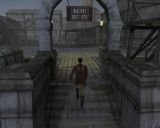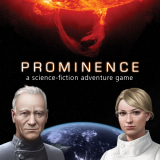Review for Reversion: Chapter 2 – The Meeting
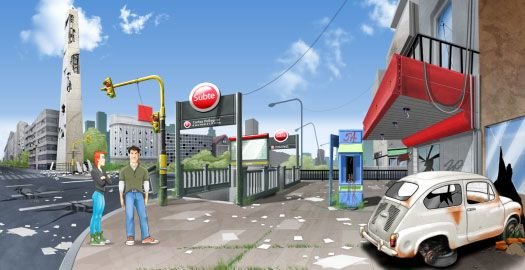
It’s 2035, and Buenos Aires lies in ruins in the wake of a hostile takeover by a paramilitary organisation when twenty-something Christian comes to his senses in a dilapidated hospital. Suffering from post-traumatic stress-related amnesia, he thinks he is still in 2015 and takes a while to grasp his situation: he is a prisoner of the notorious Colonel, and an important one at that, though he cannot recollect why. But despite his disorientation, Christian has enough presence of mind to understand his precarious situation, and embarks right away on the titular goal of the freeware prelude Reversion: Chapter 1 – The Escape.
Chapter 2 – The Meeting is the first commercial episode of the proposed six-part Reversion series, set in the immediate aftermath of Christian’s escape. Erstwhile fellow inpatient Victoria agrees to help Christian track down the mystery scientist whose photo is the only link to his past, and sets him up with über-geek Pablo, a member of the secret resistance plotting against the militia. Considerable legwork and Pablo’s resources bring Christian somewhat up-to-date with the convoluted premise of the series, but just when things appear poised on the verge of a breakthrough, the game wraps up with a ‘to be continued’.
Developed by indie Argentinian studio 3f Interactivo, Reversion follows Christian as he pieces together the events that led to the fall of Buenos Aires – and the possible role he played in it – and presumably will go on to devise a way to reverse the disaster and restore control to the legitimate government. The hour-long free first chapter limits the backstory to an exposition on the plight of the city and focuses on Christian’s escape from the hospital, which now serves as the militia’s base. The Meeting is a half-hour longer and divulges more of the plot, including a fairly significant lead into Christian’s past and what (at present) appears to be an oft-rehashed premise involving time travel and world domination, even as the protagonist diligently unlocks a multitude of doors and containers en route to the all-important scientist.
The political turmoil in the city is credible and intelligently incorporated into the plot: as with any dictatorial coup, there is a deep sense of discontentment among a local populace, including many forcibly conscripted soldiers, and this fear and frustration seem to be coalescing towards active revolt, evident in the few conversations Christian has with other characters. On the other hand is the whole sci-fi aspect of the story, glimpsed in the fleeting segments with the Colonel. It is apparent right from the start of the series, given that twenty years seem to have elapsed during Christian’s coma and he hasn’t aged, that a technological marvel involving time manipulation has allowed the militia to wrestle control of the city. But it remains to be seen how intricately this concept is meshed into the otherwise realistic story, or if the superpower is wielded as a weapon greater than a plot device.
The best part about Reversion so far is that it cuts straight to the chase. Christian is a man of action, and does what he must without getting bogged down by details – or lack of them. This sets up a continuous flow of familiar and easy inventory- and conversation-based quests which lead linearly from one to the next without springing any unreasonable – or even unexpected – twists. Each episode's title spells out the one-note agenda Christian has for that chapter: in part one, it was to escape from the hospital; this time, it is to meet the scientist. All activities are geared towards achieving this narrowly-defined goal, and barring a very brief encounter with Maria, a young militia woman mourning the death of her soldier boyfriend, there are no diversions along the way to add depth to the overall story or its characters.
In keeping with the basic emphasis of the story, Christian's tasks involve the likes of replacing dead batteries, figuring out simple codes, and digging graves. His acquaintances are only vaguely helpful, and for the most part he ventures alone in this dystopian city now bereft of citizens, who have either been drafted by the militia or have fled in fear. But this traditional point-and-click adventure doesn’t capitalise on either its fascinatingly morbid scenario or its smart, resourceful lead, and ends up with only one truly enjoyable quest – the discovery of Pablo’s hideout. The rest of the time your objectives are predictable and run-of-the-mill. There are neither big revelations nor any genuine suspense that would force the languid pace, and nothing about the journey so far grips hard enough to make you hold your breath for the next installment. The episodic breaks happen just when you have done your job and are ready for your reward, and the dull payoffs are woefully anti-climactic.
Built on the Wintermute engine, this game is bug-free and easy to navigate. There are only a few locations: besides a revisit to the hospital, The Meeting features an abandoned subway system, Pablo’s hideout, a militia graveyard, a couple of houses, and the disintegrating, graffiti-riddled Faculty of Engineering at the local university. In a departure from the first chapter, here each new location spread across the city is added as the story evolves and can be teleported to using a GPS device. There are 8-10 hotspots per screen, all described aloud by Christian, though only a few are actually usable. Left-clicking and holding the cursor over a hotspot brings up the interactive options – look at, use and/or talk to. A hotspot revealer is always on call, while the extremely generous hint system tells you outright what to do next, though in Chapter 2 there is a time lag of a few minutes between consecutive hints. Hotspots are not deactivated once exhausted, but the game is straightforward enough that you usually know what to do next and don’t have to waste time with random clicks and guesswork.
The inventory is accessed by right-clicking, and its items can either be combined with each other or used directly with onscreen hotspots. Logical but incorrect object combinations sometimes get explanations for rejection, and objects cannot be collected without explicit reason to do so. The inventory isn’t always cleared of used objects, which leads to a bit of clutter as Christian’s collection grows, but some of these will likely find use in later chapters as they do this time, when leftover items from The Escape are reused to solve quests in The Meeting. In fact, the hospital has to be scoured once again for objects which were unnecessary – and therefore uncollected – earlier, and some of the circumstances there have been updated since Christian’s departure and yield new items this time around.
Reversion's art is clean and bright, with sharply drawn, slightly cartoonish characters and neat backgrounds that scale smoothly even to high resolutions. A couple of screens, like the once-impressive but now decrepit university building and the shattered iconic Obelisco landmark presiding over the crumbling city, are particularly attractive. Barring a bit of a slide when people walk, animation is fluid and realistic, with some well-depicted inventory-related actions like Christian pulling things out of cartons, though the more complex sequences are faded out. Facial expressions are also believable, especially Christian’s repertoire of comical smiles and shrugs. Lip syncing sort of matches the English voice acting, especially during punctuation and pauses, though it probably is a better fit with the original Spanish. The credits hint at past events, including how Christian was brought to the hospital, and advertises scenes from future episodes.
While the English localisation is generally effective, the written text is riddled with far more typos this time than in the first chapter, with many spelling mistakes and even a few his/her type of mishaps. The script has some occasional light humour, but for the most part is plain and functional. Conversation topics are preset, with each question yielding a fixed answer, but queries are added based on developing situations, and it is important to talk often to supporting characters as many quests require choosing the right dialogue. Onscreen signage continues to be in Spanish, but is usually understandable nevertheless.
Christian is likeable in remaining pleasantly calm – even cheery – despite his quandary, except when he bugs you impatiently for idling around. The rest of the cast is a bit too clichéd to be appealing, however, be it the cagey, rather manly redhead Victoria, Christian’s reluctant partner and likely romantic interest later in the series (though she has lightened up since her bite-your-head-off-sullen turn in The Escape), and the absurdly obvious villain, the Colonel, who puts in cameos after the credits in both installments. Pablo is a fountain of exposition masquerading as the archetypal geek, while a naïve, chubby guard with a sweet tooth and a runny tummy is just a mean joke.
Christian also benefits from superb voice acting, as his American-accented speech suits his age, comments and expressions. Pablo, too, is voiced well as a smart guy brimming with nervous energy, as is the bereaved soldier Maria. Unfortunately, while Victoria sounds less stiff and charmless than she did in Chapter 1, she still falters against Christian’s fluid delivery. The theme music, with its distinct Spanish influence, is upbeat and melodious, while the unobtrusive in-game soundtrack, which changes with locations and situations, adequately supports the ambient sound effects.
Though buoyed by an appealing lead and admirable production quality, both Reversion episodes are very short and easy games in a series which even after two episodes has thrown up no unique concepts, challenges or characters, nor created any real sense of urgency or threat. Some implausible circumstances, like crucial evidence existing in plain view in a location trashed and guarded by the militia, also dilute the stakes involved. On the bright side, Buenos Aires – even a futuristic derelict version of it that's much different than the one we know today – is an uncommon setting for adventures and holds great potential as the backdrop for the story, with the developers going the extra mile to include notes on its landmarks as the map expands. And with another two-thirds of the series yet to come, one hopes that future episodes will ramp up the tension to supplement the breezy gameplay.
Reversion seems to have the basic elements to produce an exciting, even irreverent, take on its pseudoscientific and political concepts, but it needs to merge them more tightly together to create an above-average experience. Also, its abridged episodic format demands greater reason than simple, streamlined gameplay for players to stay invested in it over the months between releases; less superficial characters and more compelling edge-of-the-seat cliffhangers would be a good start. After The Meeting, the series is poised for that leap of faith which can make or break its success. In the meantime, fans of easygoing point-and-click adventures are encouraged to check out part one, The Escape, available as a free download from the developer’s website; if you like what you see, then Chapter 2 is a must.













